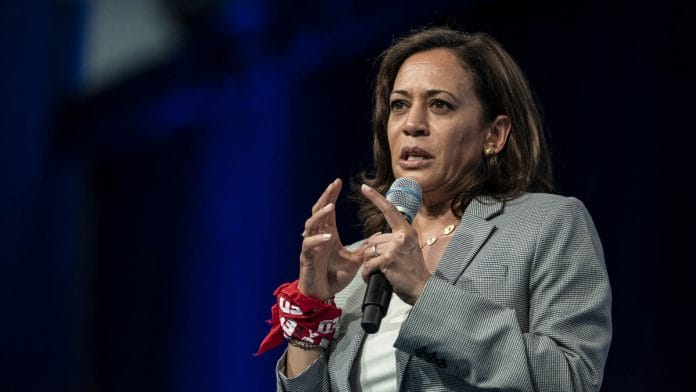New Delhi: US Democrat vice-presidential nominee Kamala Harris’ parents were part of a Black study group that was involved in the civil rights movement and included early Black nationalist thinkers at the University of California at Berkeley, according to a report in The New York Times.
The Afro American Association, as it was known then, was where Harris’s mother Shyamala Gopalan, who was born in India, and Jamaican-born father Donald Harris met in 1962. They married a year later.
In the report, Donald described the group as “an oasis” and his introduction “to the realities of African-American life in its truest and rawest form, its richness and complexity, wealth and poverty, hope and despair”.
In 1964, they had Kamala. The couple split five years later.
As the vice-presidential nominee said in her speech at the Democratic National Convention in August, “They fell in love in that most American way — while marching together for justice in the civil rights movement of the 1960s.”
In an interview to SK Weekly in 2003, Gopalan explained how her decision to marry a non-Indian was also a radical one, “…for Brahmins, the bloodline is the most important. My family, named Gopalan, goes back more than 1,000 years.”
Also read: Kamala Harris can be both 100% Black and Asian. But Americans still don’t get it
From colonial subjects to student activists
Both Shyamala and Donald grew up in British colonies, in India and Jamaica, respectively.
When Shyamala arrived in the US around 1960, there were only about 12,000 Indian immigrants in the country. When Donald arrived, there were less than 100 students of African-descent in a student body of 20,000.
Hailing from a Tamil Brahmin family in New Delhi, Shyamala immigrated to the US at the age of 19 to pursue a Masters degree in biochemistry at Berkeley after attaining an undergraduate degree in home science at Lady Irwin College.
“It would have been difficult for her in the late 1950s to get admission into a Master’s or PhD program in biochemistry with a bachelor’s degree in home science,” her younger brother Gopalan Balachandran told ThePrint.
When asked why Shyamala chose the US and not the UK, which was the norm among Indian nationals seeking higher studies abroad at the time, he explained, “US universities were more open in accommodating students from other disciplines.”
In those days, he added, a lot of people were “not encouraging women to take up higher studies”.
Meanwhile, Harris’ father Donald, now an emeritus professor at Stanford, came to Berkeley to pursue a doctorate in economics.
The two eventually became members of the university’s Afro-American Association, which author Ibram X. Kendi describes in his book ‘The Black Campus Movement: Black Students and the Racial Reconstitution of Higher Education, 1965-1972’, as one of the critical “study-turned-protest group[s]” amid the civil rights movement.
Though the association only allowed membership to people of African descent, Shyamala was “accepted as part of the group” as she was a woman of colour from a colonised country, recalls Aubrey LaBrie, who was a member of the group at the time.
She went on to become a breast cancer researcher. Shyamala died from cancer on 11 February 2009.
Also read: ‘Singa Pennae’ Kamala Harris will only help push India-US ties despite Modi-Trump bonding






